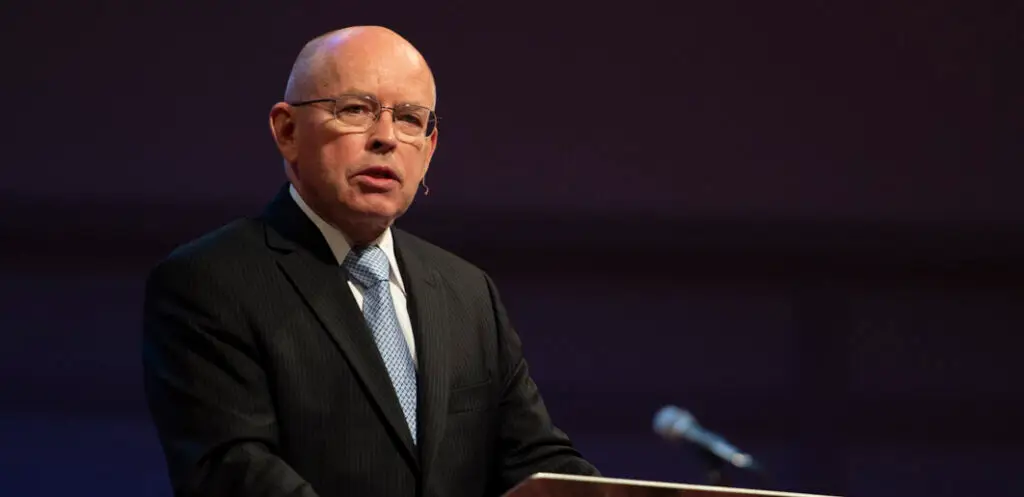Recently I received the prayer letter from Wayne Grudem. He sends these out because he really wants the saints to join in prayer that Wayne’s calling, gifts, experience, and projects be owned of God for his glory and the leavening effect of his truth. The letter this week contained a prayer request to pray in light of the “Ending my teaching career.” He explained that at the end of a theology class “I walked out of the classroom with a kind of weariness that I don’t remember feeling before. The combination of my Parkinson’s disease, my prostate cancer and its treatments, and my 76 years of age all are combining, and the result is that I don’t have the energy that I have previously had.” After consultation with Margaret and trusted observers and advisors, Wayne decided “that this would be my last semester of teaching.” Wayne began his teaching ministry in 1977-1981 at Bethel College in St. Paul. From 1981-2001 he taught at Trinity Evangelical Divinity School. In 2001 he began a 23-year tenure of teaching at Phoenix Seminary in Scottsdale, Arizona. Over these 47 years Wayne has taught more than 9,000 students. Now he will do what he has already done so well—write.
It will be worthwhile to consider Wayne’s attitude toward this pivot in life. Having parents that lived into their 90’s, close to two decades could remain (DV) and careful stewardship leads him to say, “I need wisdom from God to know what to spend my time on.” Certainly, readers of this post will sympathize spiritually with that desire and pray for the usefulness of this steward of the gospel.
In reflection on having reached such a corner in life, Wayne pointed to a biblical passage shared with him by Vern Poythress.
Do not cast me off in time of old age;
forsake me not when my strength is spent . . . .
O God, from my youth you have taught me,
and I still proclaim your wondrous deeds.
So even to old age and gray hairs,
O God, do not forsake me,
until I proclaim your might to another generation,
your power to all those to come
(Psalm 7[1]:9, 17-18).
Giving insight into the operations of Spirit-driven Christian confidence Wayne noted, “I find it interesting that I’m not thinking of old age as something to be feared. It rather feels like I’ve been running a long race and I’ve turned a corner and now I see the finish line in the distance. Thinking that perhaps 80% of the race is over is, for me, a comforting feeling.”
Wayne’s literary contribution in a number of biblical and cultural areas has been profound and formative: spiritual, theological, exegetical, business, political, ethical issues have all been addressed by this theologian. His engagement with topics of many kinds has been so consistent, voluminous, and large that any attempt to give an extensive summary would be impossible. Wayne’s book the Gift of Prophecy in the New Testament and Today [Westchester, IL: Crossway, 1988], in addition to his defense of the continued presence of the gift of prophecy, has some stern warnings against flippant or uninformed dependence on an immediate manifestation of Spirit-driven utterance. His appendices on the canon and the sufficiency of Scripture are profound and apologetically assuring. He says, “if someone claims to have a message from God for us concerning what we ought to do, we need never think that it is sin to disobey such a message unless it can be confirmed by the application of Scripture itself to our situation.” (308) He also issues this warning, “if a pastor does not prepare for a Bible teaching, but says he is ‘trusting the Lord’ to bring something to mind, then he is, in my opinion trying to force the Lord to reveal something to him when he speaks. … Stepping into the pulpit without preparing is like jumping off the pinnacle of the temple. It involves refusing to use the ordinary means God has made available and demanding that he provide some kind of extraordinary revelation to rescue you from your dilemma!” (258).
Application of biblical principles to political issues is a mark of Grudem’s sense of stewardship of the whole life. In over 600 pages of text in Politics According to the Bible, [Grand Rapids: Zondervan, 2010] Wayne develops his discussion through “Basic Principles,” “Specific Issues,” and “Concluding Observations.” That final section serves as an excellent summary of his conclusions and how the different political party commitments align with his observations. He does not dodge any tough issue and seeks to unfold relevant biblical principles into greatly diverse and detailed issues. The first specific issue is “protection of life” within which he discusses not only abortion and euthanasia, but the right for citizens to own guns. He discusses the CIA, climate change, coercive interrogation, abortion, the economy (under ten categories), marriage and family, national defense, foreign policy, freedom of speech and religion, and other particular issues. In his section on worldview Wayne begins, “The very first sentence of the Bible tells us the most important building block of a Christian worldview: “In the beginning, God created the heavens and the earth” (116). As he maintains throughout, this is God’s world, and governments and political systems will thrive and be redemptive agents or fail and increase corruption to the degree that they maintain the proper relation between human responsibility, moral vision, and just adjudication.
His Christian Ethics: An Introduction to Biblical Moral Reasoning, a book of almost 1300 pages, is not only concerned about coming to a biblical position on a large number of complex moral issues, but about developing Christian character and a desire to live to the glory of God. As in virtually all he writes, Wayne gives an exposition and defense of the full authority of Scripture as the word of God. He shows that, in addition to informing the mind and shaping one’s actions, Scripture properly conceived has a transforming effect on those who study it, cherish it, and hide its words in the heart with the ultimate effect to be conformed to the image of Christ (107-115). He gives 50 pages to the chapter on “Homosexuality and Transgenderism” dealing with large amounts of biblical material, frank discussions of the variety of unscriptural behaviors, and dissonant arguments from other ethicists. In a discussion of transgender bathrooms and locker rooms Wayne makes the judgment, “Such policies thus attempt to reinforce the lie that a person’s gender is something one can choose, not something determined by biological reality” (880).
Wayne does not shy away from all the tough issues and helps us engage with biblical awareness the possible future fallout of naturalistic relativism as applied to ethical issues. Parts 2-7 are built on the ten commandments, showing the truth of the Psalmist’s exclamation, “I have seen a limit to all perfection; Your commandment is exceedingly broad” (Psalm 119:96 NASB). Chapters close with a Scripture memory passage and a hymn relevant to the subject discussed. Though the issues are often complex and the stakes for personal integrity and social stability and justice are high, Wayne’s discussions and application of relevant Scriptures give a sweet simplicity to the reasoning process about these matters. An example of a general principle applicable to several questions of moral desire is this: “In every generation there is a temptation to depart from the sufficiency of Scripture with new kinds of legalism that God does not require. Therefore, we must avoid two errors: the error of disobeying Scripture and the error of adding to Scripture more than God requires.” (688).
His Systematic Theology (Second Edition) is close to 1600 pages of intense biblical discussion of dogmatics in seven divisions: the Word of God, God, Man in God’s image, Christ and the Holy Spirit, the application of redemption, the church, and the future. This huge systematic theology has been edited to two smaller versions useful for church studies.
Similar to the experience of many Reformed and Evangelical Christians, Wayne testifies to the pleasing and confirming influence of J. Gresham Machen’s work, Christianity and Liberalism. His evaluation of its helpfulness has prompted him to encourage a serious engagement with the breadth of its doctrine and the biblical potency of its arguments. In the section on Scripture, Wayne includes a table of J. Gresham Machen’s interaction with liberalism by distinct categories along with relevant passages of Scripture and places in Christianity and Liberalism where the issue is discussed.
None should doubt the Christological orthodoxy of Grudem. In the context of a carefully-crafted exposition of the biblical and confessional development of the church’s confession of Christ’s person (663-705), in a section discussing the question of impeccability, Wayne says, “But Jesus’ human nature never existed apart from his divine nature. From the moment of his conception, he existed as truly God and truly man as well. Both his human nature and his divine nature existed while united in one person” (673).
Grudem narrates his broad and deep engagement with contemporary and historical theology both in the text and in well-placed pertinent footnotes. Each chapter includes questions for personal application and a double bibliography. One of these locates page numbers from denominational theologies in chronological order dealing with the subject under discussion. The other is a list of works devoted to the subject. The chapter on atonement has 46 such works listed. On this doctrine, Grudem says, “In conclusion, it seems to me that the Reformed position of ‘particular redemption’ is most consistent with the overall teaching of Scripture” (743). Having staked out his personal position, Wayne warns against unhelpful and spiritually unhealthy “nit-picking that creates controversies and useless disputes” (744). Again, every chapter includes a memory verse and a hymn to memorize.
In his book entitled “Free Grace” Theology: 5 Ways it Diminishes the Gospel [Wheaton: Crossway, 2016], Wayne engaged a modern manifestation of Sandemanianism. Like Andrew Fuller before him, he examined the leading ideas of the “Free Grace” movement in the context of closely reasoned biblical exegesis, confessional history, and the moral character and necessary connection of repentance and faith. Though justification certainly includes a belief of the truth, the work of the Holy Spirit in bringing a person to a saving relationship with the Lord Jesus and his redemptive work involves more than a bare belief of the bare truth. While stating clearly the errors of the “Free Grace,’ Grudem helps the reader understand what prompts such a doctrinal reaction and seeks avenues for nurturing a spirit of fraternity.
The last contribution I will mention is his activity in beginning and bringing to fruition the translation of the Bible called the English Standard Version. Having disagreements with some of the translation theory of the TNIV, Wayne gave much time, energy, and theological expertise to that project from its beginning to its completion. He served on the Translation Oversight Committee for the translation itself and as General Editor for the ESV study Bible.
Space allows no comment on Recovering Biblical Manhood and Womanhood, his book on Business for the Glory of God, his commentary on 1 Peter, and scores of papers presented at professional meetings. Wayne has demonstrated genuine Christian character in his family relationships, parents to grandchildren. He and Margaret have served as a team for encouragement and hospitality for many peregrinating fellow Christians. I can speak confidently for many thousands of Christians a sincere word of gratitude to him for his unrelenting and uncompromised love of the Bible, the God of the Bible, the redemption of the Bible and his work to make it known. We pray that his stewardship of the gospel in his post class-room labors will be satisfying as he views the “finish line in the distance.”





























